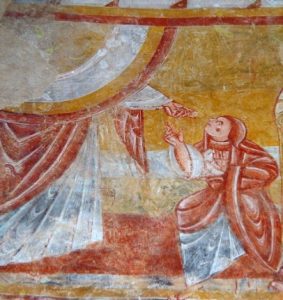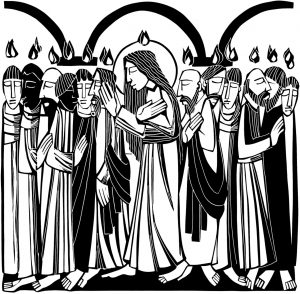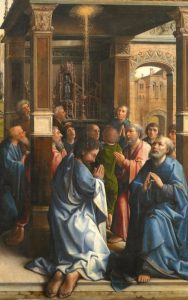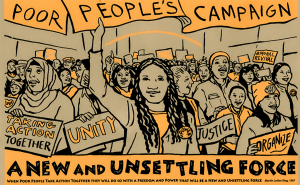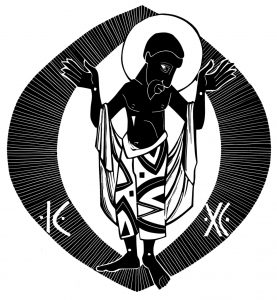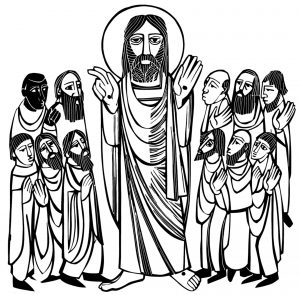 This sermon was shared by Joyce DeGreeff on April 15th.
This sermon was shared by Joyce DeGreeff on April 15th.
Luke 24:36-50
This morning’s Gospel story is jam packed with exciting drama, deep emotions, and rich theological insights. In reading and re?ecting on it, there seem to be four or ?ve different sermons I could preach today. As with other post-resurrection appearance stories, this one invites us to hear about Jesus’ encounter with his grieving disciples as we consider notions of “peace”, “forgiveness”, the “holy spirit” and “blessing” and wonder what our own place in this narrative might be.
For me the most compelling questions inspired by this text revolve around the intimate connection with the Holy, the experience of God’s presence, God’s love, and God’s grace. How do we encounter the Risen Christ?…What’s being offered? How do we recognize it and receive it? And how are we called to respond?
In Luke, just before the story that we heard this morning, Jesus appears to two men on the Road to Emmaus. The sequence of events that follow are very similar to the ones that happen when Jesus moves on to his disciples. The men, confused and frightened, fail to recognize him at ?rst, but then Jesus offers words of explanation, his body as evidence, and a suggestion that they eat together, all of which help them to realize that they are with the Risen Christ. In the Emmaus story this moment of enlightenment is referenced by “opening eyes” and “burning hearts” and in today’s account, Luke states that Jesus “opened their minds to understand the scriptures” and they at once realized who was in their midst.
Can you imagine how Jesus’ grieving followers must have felt in this moment? Confused and afraid, at ?rst, yes. But also relieved and overjoyed that this personwhom they had come to love and trust was with them once again. Last week in Bible Study, we were looking at one of the post-resurrection appearance stories in John and Ruth Sedlock, one the facilitators of the discussion, began by saying with passion and sheer joy: “All of these post-resurrection stories are just ?lled with so much excitement!” She’s right! So what is all the excitement about?
On the surface, just the mere fact that Jesus has come back to life to offer more time with his friends is reason alone to celebrate. And yet, what he offers them is so much more. He begins by saying: “Peace be with you.” – he says this once in today’s account and three times in the passage from John that we studied last week. “Peace” I give to you…not as the world gives but something more special. A peace that surpasses all human understanding. Have you ever felt that kind of “Peace”?
Jesus goes on to explain how his death and resurrection are related to God’s promise of forgiveness and liberation from sin – that which separates us from the Love and Life that God desires for us. Have you ever felt the power of such forgiveness?
“You are Witnesses to these things.” Jesus tells his disciples. But lest they think that they will be left alone to ?gure out what this all means, Jesus invites them to wait until they are “clothed with power from on high” – a reference to the Holy Spirit which Jesus has promised will be with them when he leaves. Can you remember a time when you felt the company of the Holy Spirit – the abiding presence of God comforting you and empowering you to do hard things?
And ?nally, Jesus offers his disciples a “blessing” – a reassurance that wherever they go, he will be with them, in Spirit if not in body, offering courage and guidance. In what ways have you received and offered blessings in your life?
Encountering the Risen Christ – experiencing a glimpse of Divine Grace – is sometimes very personal and can mean different things to different people. Last week, at Northeastern University where I work as a college chaplain, there was a celebration honoring my 20 years of campus ministry there. As part of the program, a video was shown in which various alums going back as far as 1997, shared how the ministry impacted their lives and how they experienced God’s love through the people and leaders of the group. Time and time again, the students spoke of a welcoming and inclusive community where worship was meaningful, questions were encouraged, joys and challenges were held with deep appreciation and concern, and a commitment to community outreach and social justice was a priority. I’ll admit that it was nice to hear that the ministry had made such a difference in people’s lives, but what was more poignant for me was the willingness of these alums to be “witnesses to these things” – to share how they encountered God while at college.
In our busy lives, we may not always recognize holiness in the world, in one another, or in ourselves. And unless we’re asked to talk about it, we we don’t often have the opportunity to share our experiences of encounter with God’s presence.
With this in mind, I decided to reach out to a few of the communities that I am most involved with here at the church – the Adult Bible Study, the Walden Pond Prayer Walkers, and the Youth Group. To each of these groups I asked some version of the questions: “How do you encounter the Risen Christ? When do you see or experience God’s Love? In what ways do you sense the company of the Spirit?”
Many of you responded with mentions of worship, expressing how you see Jesus in the Scripture readings, sermons, and communion, and ?nd God’s companionship in the songs, the prayers and in the community of fellow seekers. One person wrote: “Every person in that room is there, in love, forgiveness and encouragement, for every other person in the room.” Someone else expressed it this way: “It is a sense of unity with others who are also worshipping in that place at that time. My encounter is often singing hymns with the others or in the silence of praying with others. I would call it a feeling of joy.”
Some of you noted that you experience God in the Adult Enrichment programs offered by the church. Whether in Bible Study, or Sunday Morning Forums, on Retreats, in Book Group, or in prayer at Walden Pond, taking time out of your day to be in fellowship and re?ection with other members of this congregation provides much solace and an assurance that Christ is truly in our midst.
Many people ?nd God in Nature and this too came through in the responses that I received. Sometimes God appears in the woods where we spot birds and deer, or on the beach as we watch gulls, crabs, and rolling waves, or in the majestic views on a mountain top. To quote one of you: “God shares the beauty of every unique creation: trees, ?owers, and rocks. God surprises and delights us with every fresh sight. A fresh crispness in the air, the smell of spring, the sparkle and splash of water ?owing in streams, waterfalls, crashing waves – all God’s caresses.”
The way we care for one another in our congregation also came up. We listen to one another’s joys and concerns with attentive hearts. We work to make worship and programs accessible and relevant for all ages and abilities. And we engage with the world through service and advocacy work.
“Jesus is alive with every kindness and caring act that we do”, someone wrote, “In Sunday Fellowship I see Jesus in the caring and thoughtful way that the participants care for one another. When we sing together, pray, and share, I see faith growing. Jesus brings us a sense of quiet awe as he is in all of us to recognize at any age or time.”
The youth responses echoed many of those shared by the adults, especially those relating to caring for one another. Witnessing God’s love through how we reach out to those in need, was by far the most popular response from the teenagers. Whether in direct service, donating money to organizations that help the poor, or working for more justice and advocacy for refugees, immigrants, and other displaced people, it was clear to me that for these young people, the power and presence of the Risen Christ shines most brightly when we put our faith into action.
Finally, one person shared a very powerful and personal story about an encounter that she had with Jesus right here in this church. Years ago, when the church was discerning whether or not to of?cially become an “Open and Af?rming Congregation”, she faithfully went to all of the study sessions and discussions in order to learn more and remain open to the Spirit. Having been raised in a more conservative Christian tradition, many of the thoughts and theologies in these conversations were new and perhaps challenging. But she told me that when it came time for the vote, she felt as if Jesus was literally sitting by her side whispering to her not only how he would vote, but also urging her to stand up and witness to the transformation in her own heart and understanding. It felt as if the Spirit was speaking in and through her to proclaim Jesus’ message of radical Love and hospitality.
We are blessed, here at WCUC, to encounter the living Christ in so many different ways. The love and comfort that the Spirit brings to us in all sorts of situations can be profound. For me, most recently I have experienced the closeness of God’s grace and peace in the midst of losing people I have loved. Over the past year and a half, three of my extended family members have passed away as well as a very close high school friend. And I’ve been all too aware of the extraordinary amount of recent deaths in my work, in our church, and in the Concord community this year. Two of the students who are in our campus ministry at Northeastern lost their fathers in very sudden and tragic situations. Many here in our congregation have lost spouses, parents, siblings, extended family members, and longtime friends. And in our community we have felt the pain of losing three teenagers and two mothers of young children, much too soon. The weight of this grief is heavy.
Oh, what we would give, to have our loved ones appear just one more time – even if only brie?y. What a gift it would be to see them again and to hear them say “Peace Be With You”, just as the disciples heard from their beloved Jesus all those years ago. Sadly, we don’t get to have this moment. But we do get to hang on to the blessings that our relationships have offered us and we do get to carry these blessings with us as we live out the rest of our time here on Earth.
Theologian, author, and artist Jan Richardson, who also happens to be one of my favorite spiritual teachers, writes beautifully about love and loss in the context of Easter and the Resurrection. Nearly ?ve years ago, Jan lost her husband Gary, when he died from a sudden brain aneurism. Heartbroken by this, Jan found solace in the company of close friends and family, her faith in God’s abiding presence, and in her writing, both on-line and in published books. In her blog, The Painted Prayerbook (www.paintedprayerbook.com), Jan recently wrote a re?ection piece on the appearance of Jesus to his disciples in which she connects the ideas of “loss” and “blessing” this way:
“When we experience horrendous, life-altering loss, it can seem that the blessing we had known has indeed disappeared. When a person who had embodied that blessing and borne that blessing in our lives is no longer physically present, it can become dif?cult to believe that the blessing is still present, is still active, is still in force. Part of the invitation of grief is to keep our eyes and our hearts open to how the blessing persists, how it still wants to be known in our lives, and how it wants to help us live even when our lives have fallen apart.
A blessing does not end. This is part of the fundamental nature of a blessing: the energy and the grace of it cannot dissipate or disappear. The essence of a blessing endures. It lives in the community that mediated the blessing and continues to hold it in memory and celebration; it lives in the hope that persists; it lives most of all in the love that called forth the blessing in the ?rst place, the Love that is stronger than death.”*
In all of this, I hear the echo of Jesus’s voice: “You are Witnesses to these things.” We are witnesses to the blessings in our lives, called to recognize them, to give thanks for them, and to share them as often as we can. And we are witnesses to the never ending peace that comes from knowing a God of grace, hope, forgiveness, and companionship. “Therefore, since we are surrounded by so great a cloud of witnesses,” as it is written in the 12th chapter of Hebrews, “let us also lay aside every weight and the sin that clings so closely, and let us run with perseverance the race that is set before us, looking to Jesus the pioneer and perfecter of our faith.”
May our eyes be opened to see more fully the gifts being offered and may our “burning hearts” ignite in us the conviction and courage to be Christ’s hands in the world.
*From Jan Richardson’s Website: Using Jan’s words For worship services and related settings, you are welcome to use Jan’s blessings or other words from this blog without requesting permission. All that’s needed is to acknowledge the source. Please include this info in a credit line: “© Jan Richardson. janrichardson.com.”
Books by Jan Richardson: The Cure for Sorrow: A Book of Blessings for Times of Grief Circle of Grace: A Book of Blessings for the Seasons In the Sanctuary of Women: A Companion for Re?ection and Prayer
